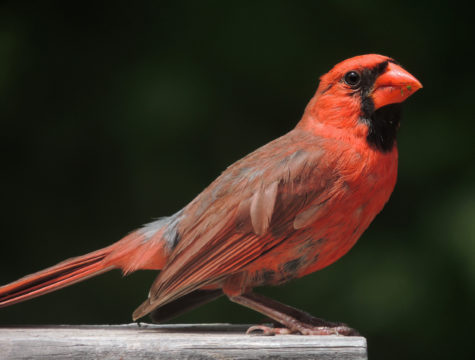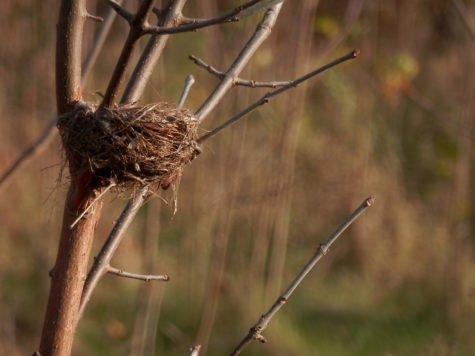
Two weeks ago, while sitting on the floor building a puzzle with my toddler, I heard a window-rattling thud. I figured it was the neighbor’s soccer ball hitting the glass door again, so I got up feeling somewhat ticked. When I looked out the window, the first thing I saw was an absolutely apoplectic male cardinal, chittering madly and darting around the boxwoods off my deck. The next thing I saw was the bird’s offspring, a fledgling we’d been watching learn how to fly. He was writhing on the top stair, his left wing flapping and twisting while his right one lay unmoving. He was breathing heavily. He had flown straight into the glass, obviously at high speed. (My blinds were up on that sunny day and I’ve already ordered bird-deflecting decals, so please don’t @ me over this.)
I took my daughter upstairs, figuring that if we left, the male bird might feel safe enough to approach the house and try to flip the baby bird over, or maybe move him. When we came back, the young bird was still. The breath had gone from his breast and his eyes, half-open, gazed blankly to one side. The older male bird was gone. My daughter is too young to understand why I was now crying, so I brought her back to her puzzle without a word.
Then the male bird reappeared, still agitated but now less concerned about my presence in the window. He had food in his beak. I watched, incredulous, as he landed on my deck, hopped over to the baby bird, and dropped the morsel into his baby’s mouth. Then he flew to our patio table, still chittering, then flew back. He flitted around the dead bird another few times, checking out its face. Finally I had to look away.
I’m not a sappy person, I promise. But this experience took my breath away. Surely, part of my reaction stems from becoming a new parent in the last year and a half, but there was something else on my mind that week. The day before, scientists announced they had found something that I believe will be remembered for millennia, as long as humans look to the sky and talk about what we see up there: A planet orbiting Proxima Centauri, the star nearest our own.
It’s a monumental finding, in the sense that it is significant, but also in the sense that it is a landmark, a point in time to be remembered. This star has inspired dreams of interstellar travel for a century; now, it conjures fantasies of aliens right next door. Would these aliens be intelligent beings? Would they wonder about the sun, an otherwise insignificant, yellowy middle-aged star, which happens to be the closest star to theirs at this particular epoch? Is it possible that they might wonder whether another rocky world exists around the sun, with life forms who wonder about them in turn?
Nobody can answer these questions, but I find it interesting that they are no longer ridiculous, at least among a growing majority of scientists. The cosmos is chockablock with worlds. Surely life arose on at least a few of them. Still, I doubt very many people would care about microbes on a rock illuminated by a pinkish sun. Intelligent life is what we really want. That’s why people got so excited, just a week after the Proxima discovery, about a possible signal from a sunlike star called HD 164595. (That is almost guaranteed to be nothing, so everyone chill out).

What do we mean when we talk about intelligent life? Birds are intelligent, at least to some degree. They communicate, and in the most beautiful ways. They hold elaborate rituals. They build shelters for themselves using materials from their environment. Some species of birds are capable of apparent emotional connection: Crows hold a type of death ceremony for their brethren, which has been compared to a funeral and at the very least seems to be a recognition that another animal died. But in the framework of the Search for Extraterrestrial Intelligence, or SETI, they don’t really count. They never figured out how to build a radio. Birds can navigate according to the Earth’s magnetic field, but they can’t manipulate the electromagnetic spectrum, so they can’t send sound waves out into space, with samples of Chuck Berry or a thunderclap or their own trills and warblings. Does this mean we’d be disappointed to find birds on another planet? I don’t think so. To many of us who wonder what’s out there, intelligent life means something much deeper than use of radio waves.
That male cardinal was so upset as his baby bird lay dying. Was it sad? Birds probably don’t experience sadness in a way that’s comparable to human emotion, so that’s not the right word. It was certainly panicky, though. Was it realizing, on some dinosaur-brain level, that now its offspring would not live to pass on its genetic material? Did it feel disappointed, or cheated, even, that it and its mate had devoted so much precious time and biological resources to raising the young bird, only to watch it die? I only know it was upset. It was freaking out. To me, a non-biologist observer with a sample size of one, its reaction signified some kind of intelligence, maybe even an emotional kind.
I haven’t seen the male cardinal or his mate since then. I have been looking for them every day. I wonder if those birds think about their lost baby, whose body my husband tenderly picked up so it would not be scavenged by raccoons. I wonder if the same pair will try again next year, and encourage another fledgling to fly, perhaps remembering to guide it away from our house.
Like many people who write about the cosmos, I think there is probably life on other worlds. Of course we can’t know what it might look like, so our best guesses are based on the only world we know, our sample size of one. We are so anthropocentric that we assume intelligent life would have developed a beacon based on electromagnetism. That is the most efficient way to look, so that’s what we do. But calling it “intelligent life” is an oversimplification, and I don’t think it really captures what we seek. I think we are looking for something more than life that contemplates its place among the stars, and communicates using light. To find something truly profound, we would need to find life that does something simpler, and more ridiculous, and more dangerous: Life that loves.
_________
Rebecca Boyle is a freelance science writer in St. Louis. She is a contributing writer for The Atlantic and her work regularly appears in Popular Science, New Scientist and other magazines. Find her on Twitter @rboyle31.
awesome read beautiful writing – not sure if this will help any but Cardinals have multiple eggs in multiple clutches per yr.
Made me teary. Beautiful. And rest in peace little bird.